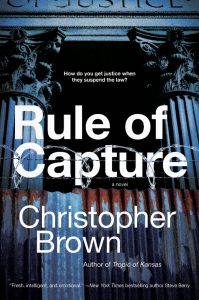Christopher Brown Guest Post–“Truth and Reconciliation and Science Fiction”
The best science fiction I have read this year came in a series of emails from the future.
The Training Commission is a collaboration between authors Ingrid Burrington and Brendan C. Byrne, produced with sponsorship from Mozilla. It’s an epistolary work, a fragmented narrative in the form of electronic correspondence from a character on the run in a near-future USA that is both familiar and incredibly strange. Rich with worldbuilding that conjures futuristic wonder from the immanent now, like this field report from the principal correspondent, Aoife, recounting her visit to Washington’s newest public attraction on May 12, 2038:
“As seen from the National Mall ferry, the finally-completed Reconciliation Wing of the Smithsonian American History Museum is a major architectural interruption in the capitol’s low-lying landscape of retrofitted and elevated 20th-century buildings–which is ironic, considering how much attention went to making it seamlessly connect to the natural systems of the Anacostia canals. The first new construction project on the Mall since the creation of the DC canal system, the Reconciliation Wing has been subject of curiosity not only as an opening move in historicizing the National Shitstorm (ahem, The Interstate Conflict) but also as a formal progression in post-Capitol architecture. (Unless, of course, you believe that the bare-chested, perpetually shouting hologram of Alex Jones in the rear sculpture garden of the Newseum cannot be topped.)”
The Training Commission is probably the smartest example I have read of the many stories that have appeared in recent years about a Second American Civil War (a subgenre that Paul Di Filippo, in a longer view, calls “America Disunited” stories). I have read most of those, because I wrote one, and so people tend to send them to me. The Obama-to-Trump Zeitgeist gave fresh relevance to Margaret Atwood’s Reagan-era masterpiece The Handmaid’s Tale, and generated a spate of new books set in similarly fractured Americas, including Omar El Akkad’s critically well-received American War, Lilith Saintcrow’s Afterwar, Claire O’Dell’s A Study in Honor, Craig Di Louie’s Our War out this month, and my own Tropic of Kansas. All these works use the tools of speculative fiction to put a funhouse mirror up to the contemporary world, adding things that aren’t there to reveal hidden truths about the things that are, or to just have fun with the things that scare us. The seriousness of the projects varies widely, but they all share a powerful sense of the upending of the political order that has long defined our social realities, and the absence of clarity about what it will be replaced with.
Of these works, The Training Commission has the clearest vision of a plausible what’s next, while making the reader do the most work to piece that future narrative together from fragmentary clues peppered through a series of emails. But the basic idea is a hilarious and brilliant vision of how our most do-gooding aspirations and tendencies have a knack for enslaving us to our own worst qualities. In the near future, the nation really has degenerated into violent civil conflict. In the aftermath, well-intentioned centrists come up with the idea of using Big Data to power an algorithmic direct democracy—collecting inputs from Americans about the kind of country they want (the Training Commission of the title), and using them to program an artificial intelligence that becomes the real government of the re-United States. Skynet meets Facebook, a digital mirror of our collective pathologies whose gaze cannot be evaded.
That data gathering exercise, the Training Commission of the title, is the story’s take on an idea that a lot of these broken America stories lead to: the desire for a kind of truth and reconciliation commission that would finally deliver justice for the crimes committed in our names by the nation-states of which we are each a constituent part, and to hold accountable the individual perpetrators of institutional wrongs.

The idea of an American truth and reconciliation commission is not new. It’s been kicking around at the margins, in real life and in the minds of genre writers, for some time. I found a flurry of online discussions among SF writers from 2008, when the Australian prime minister delivered the government’s first public apology to the nation’s indigenous peoples—around the same time that the reboot of Battlestar Galactica played out an allegory for our own crimes in the War on Terror. More recently, I’ve come across a variety of writers talking about such themes emerging in their works in progress. And throughout the genre right now is a powerful movement to reenergize its capacity to liberate identity through the fantastic’s promise of unbounded possibility, and realize more emancipated worlds in fiction and in real life.
I believe that part of what’s driving this notion of what one writer half-jokingly called “reconciliationpunk” is a sense that, to be able to imagine authentically better futures in our stories, we need to do a better job of understanding the past. Science fiction’s joy in freeing itself from the gravity of the real world gives it an intrinsic tendency to be ahistorical.
In the world in which science fiction was born, a world that was ruled by a generally shared consensus of the factual basis of reality, that liberation from truth was a healthy escape valve for imagination, one that incubated utopian possibilities. But the world we live in now is one the science fictional imagination bequeathed us—a network culture multiverse populated with infinite strands of narrative and a digital sandbox that lets us each curate our own reality. In this world, the literature of the fantastic has the capacity to reveal the truth in ways realism cannot.
J. G. Ballard often talked of how his approach to writing science fiction was informed by his experiences as a medical student—taking the same approach to the examination of the society around him and the selves that populated it as he took to the dissection of a human body. The proliferation of broken America stories is an example of how that science fictional scalpel has a knack for peeling away the membranes to reveal Gibson’s “unevenly distributed” futures. Consider Gibson’s own most recent futures, in The Peripheral—one that feels like a tainted utopia on the other side of apocalypse, another that feels like a broken-down Tomorrowland version of the rural past, both resonant with a sense of truth about the veiled present. Science fiction is a powerful laboratory not just for extrapolating where things are going, but also for showing how things really are. Sometimes through exaggeration, sometimes through alteration. And by inverting the normal markers of identity and transporting the reader away from the world they know, into a world where, for example, there are no Republicans or Democrats, or no men and women, we have tremendous power to reframe how people see both the imagined and the real worlds. To create a prism through which we can see what justice really looks like.
Most of the broken America stories share a common worldbuilding premise along these lines—treating the USA as the “third world country,” upending the narrative of civilizational status we are conventionally taught with a fresh postcolonial perspective. Tropic of Kansas is a post-9/11 novel set in a world in which 9/11 never happened, and the dark retributive energy of collective anger and petrocapitalist appetite that powered that era (and still clouds our politics) is instead directed within. In my new novel, Rule of Capture, the lawyer protagonist has learned his trade representing American officials who have been prosecuted by an international war crimes tribunal for torturing their enemies—a very literal expression of that desire to use fiction to envision a justice that eludes us in real life. The ultimate purpose of such dystopian exercises is, at least in terms of overt intentions, utopian. We cannot imagine more just futures unless we inform them with an understanding of the injustices of the past, and the present.
The proliferation of Handmaid cosplay in the galleries of patriarchal state legislatures is one recent example that proves the potential of science fiction to show what’s really going on in what we used to call consensus reality.
In the aftermath of the “End of History” that extinguished our belief in the possibility of a world without private property and social class, and the financial crisis that discredited the neoliberal dream of perfect welfare founded on free markets, utopian aspirations have largely disappeared from our political discourse. They are not easy to find in our science fictions, either, even as we populate them with more diverse and liberated communities. Broken America stories express our recognition that the old orders are breaking up, and our anxieties about not knowing what will replace them. Reconciliation commissions in imaginary worlds are a weird way to find our way to better futures in the real one. But in a world “ruled by fictions of every kind,” it takes the tools of make-believe to expose the real-world truth.

Christopher Brown is the author of Tropic of Kansas, a finalist for the 2018 John W. Campbell Award. He was a World Fantasy Award nominee for the anthology he co-edited, Three Messages and a Warning: Contemporary Mexican Short Stories of the Fantastic. His new novel Rule of Capture is now available from Harper Voyager.






